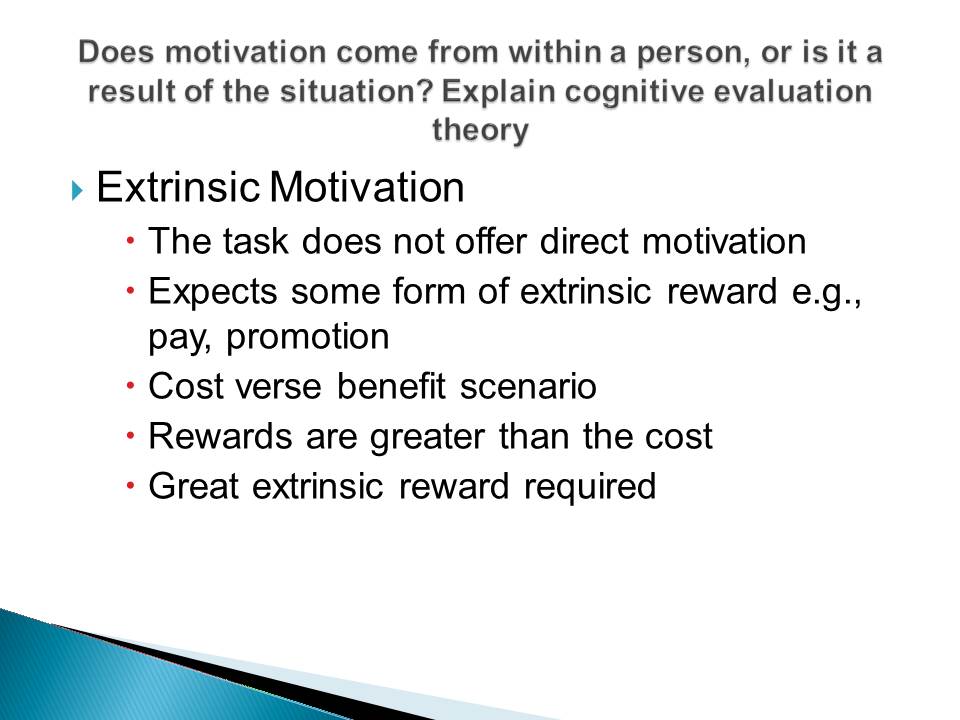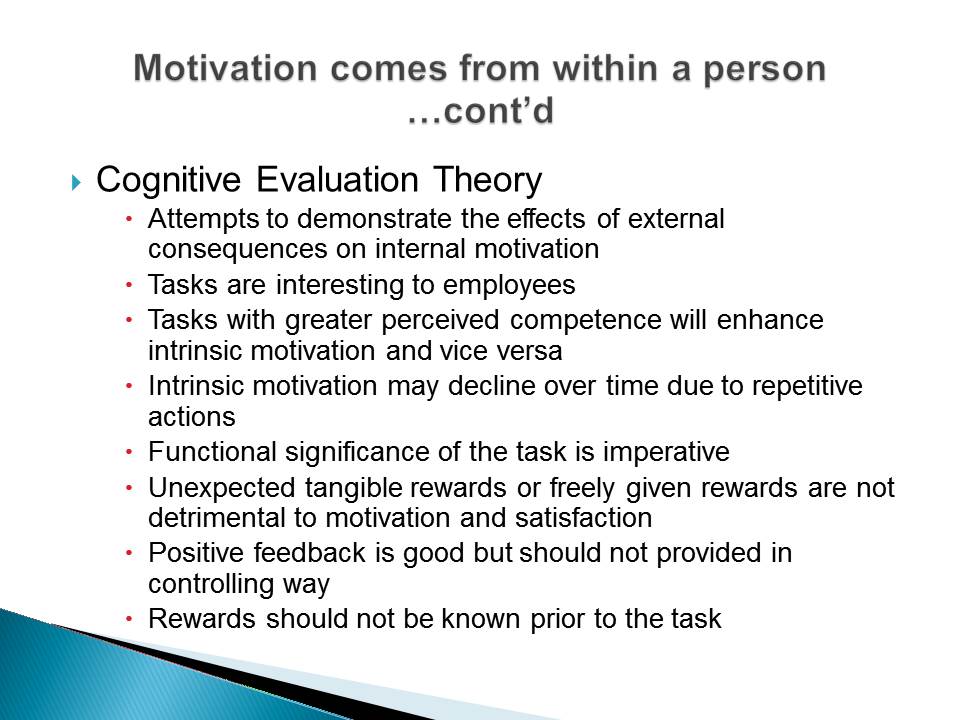Motivation comes from within a person, emanating from their personal desires and aspirations. Whether it is the drive to achieve success, pursue goals, or overcome challenges, motivation is an inner force that propels individuals towards action.
Motivation is an integral aspect of human psychology, influencing behavior, performance, and overall well-being. It serves as the catalyst for personal growth, enabling individuals to push beyond their limits, overcome obstacles, and persevere in the face of adversity. As an internal source of inspiration, motivation can vary from person to person, rooted in their values, beliefs, and experiences.
Understanding the factors that drive motivation is crucial for individuals to harness their inner potential and accomplish their aspirations.
Internal Factors Of Motivation
When it comes to understanding motivation, it is essential to recognize the various factors that play a crucial role in driving individuals towards achieving their goals. While external factors like rewards and recognition can certainly influence motivation, it is the internal factors that truly shape an individual’s drive and determination. In this section, we will explore three key internal factors of motivation: intrinsic motivation, self-efficacy, and personal values.
Intrinsic Motivation
Intrinsic motivation refers to the internal desire and passion that comes from within an individual. It is the driving force that propels individuals to engage in activities because they find them inherently enjoyable, interesting, or satisfying. Unlike extrinsic motivation, which relies on external rewards or punishments, intrinsic motivation is based on personal enjoyment and fulfillment.
Individuals who are intrinsically motivated exhibit a strong sense of curiosity, self-discipline, and perseverance. They are more likely to pursue actions that align with their personal interests and values, rather than merely seeking external validation or rewards.
Key Characteristics of Intrinsic Motivation:
- Engagement in activities for the sheer joy and satisfaction it brings
- Self-determination and sense of autonomy
- Desire to learn and explore new things
- Long-term commitment and perseverance
- Less dependent on external rewards or recognition
Self-efficacy
Self-efficacy plays a crucial role in determining an individual’s level of motivation. It refers to a person’s belief in their ability to successfully accomplish a specific task or achieve a particular goal. When individuals have high self-efficacy, they possess a strong sense of confidence in their skills, knowledge, and capabilities.
Individuals with high self-efficacy tend to set challenging goals for themselves, persist in the face of obstacles, and exhibit higher levels of motivation. They believe that their efforts will lead to positive outcomes and are more likely to take on new challenges, embrace growth opportunities, and overcome setbacks.
Factors influencing self-efficacy:
| Performance accomplishments: | Successful past experiences increase self-efficacy. |
| Vicarious experiences: | Observing others’ successes can boost self-efficacy. |
| Verbal persuasion: | Positive feedback and encouragement influence self-efficacy. |
| Emotional states: | Anxiety and stress can negatively impact self-efficacy. |
Personal Values
Personal values are deeply held beliefs and principles that guide individuals’ behavior and decision-making processes. They provide individuals with a sense of purpose, direction, and inner motivation. When individuals align their goals and actions with their personal values, they experience a greater sense of fulfillment and motivation to pursue their passions.
Identifying and understanding personal values is essential for maintaining long-term motivation. Individuals who are aware of their core values can set meaningful goals that resonate with their principles, and are more likely to remain committed and engaged in their pursuits. Moreover, personal values help individuals prioritize their actions, make ethical decisions, and find deeper satisfaction in their endeavors.
Why personal values matter for motivation:
- Provide a sense of meaning and purpose
- Drive commitment and dedication
- Guide decision-making and actions
- Create alignment with personal identity
- Enhance satisfaction and fulfillment
In conclusion, intrinsic motivation, self-efficacy, and personal values are critical internal factors that significantly impact an individual’s level of motivation. By fostering intrinsic motivation, building self-efficacy, and aligning actions with personal values, individuals can unlock their full potential and achieve their goals with passion and determination.

Credit: www.itstactical.com
External Factors Of Motivation
While motivation is often regarded as an internal force that propels individuals to take action, it is important to recognize that external factors can play a significant role in shaping and enhancing motivation as well. External factors of motivation refer to the influences that originate outside of a person and can impact their drive, focus, and commitment. These external factors can be varied and can include rewards and incentives, social support, and environmental factors. Let us explore these external factors and how they contribute to a person’s motivation.
Rewards And Incentives
Rewards and incentives have long been recognized as powerful motivators. When individuals are presented with the promise of a reward or an incentive that aligns with their desires, they often feel a surge of motivation to work towards achieving that goal. Rewards can take various forms, such as financial bonuses, recognition, promotions, or even simple praise and acknowledgement. By attaching a tangible or intangible reward to the completion of a task, individuals are more likely to stay focused and committed, as they understand the potential benefits that await them. These rewards serve as external stimuli that fuel motivation and encourage individuals to go the extra mile in their pursuit of success.
Social Support
The presence of social support can have a profound influence on an individual’s motivation. Human beings are inherently social creatures, and the connections they form with others can greatly impact their drive to achieve their goals. Social support can come from various sources, including family, friends, colleagues, mentors, or even online communities. When individuals receive encouragement, advice, and assistance from those around them, they often experience a boost in their motivation levels. The words of encouragement, shared wisdom, and the feeling of being part of a supportive network can provide individuals with the sense of belonging and significance they need to stay motivated throughout their journey.
Environmental Factors
The environment in which individuals operate can also influence their motivation levels. Environmental factors encompass elements such as physical surroundings, work environment, and organizational culture. A well-designed workspace that is conducive to productivity, with ample natural light and comfortable seating, can positively impact motivation. Likewise, an organizational culture that values and promotes innovation, growth, and collaboration can inspire employees to be motivated and engaged. On the other hand, a negative or unsupportive environment can hamper motivation, leading to decreased enthusiasm and lackluster performance. Recognizing the importance of the environmental factors and cultivating a positive and supportive atmosphere can significantly enhance motivation levels among individuals.
In conclusion, while motivation largely originates from within a person, external factors can have a notable impact on its intensity and sustainability. By leveraging rewards and incentives, fostering social support, and creating favorable environmental conditions, individuals can amplify their motivation and drive towards accomplishing their goals. As we acknowledge the interplay between internal and external factors of motivation, we broaden our understanding of what drives human behavior and unlock our potential for success.
The Role Of Personality In Motivation
Motivation is a powerful force that drives individuals to achieve their goals and fulfil their desires. While there are various factors that contribute to motivation, one significant aspect that cannot be overlooked is personality. Our personality traits can play a crucial role in determining our level of motivation and how we respond to different situations.
Big Five Personality Traits
The Big Five Personality Traits, also known as the Five Factor Model, are a widely accepted framework that categorizes personality into five dimensions:
- Openness to experience: Individuals high in this trait tend to be curious, imaginative, and willing to explore new ideas and experiences. They are more likely to be motivated by novelty, challenges, and the opportunity to learn and grow.
- Conscientiousness: People with high conscientiousness are organized, disciplined, and goal-oriented. They have a strong sense of responsibility and are motivated by achievement, accomplishment, and perfectionism.
- Extraversion: This trait refers to how outgoing and sociable a person is. Extraverts are energized by social interaction and external stimuli. They are motivated by recognition, social approval, and the opportunity to be in the spotlight.
- Agreeableness: Individuals high in agreeableness are cooperative, compassionate, and empathetic. They tend to be motivated by a sense of harmony, helping others, and building positive relationships.
- Neuroticism: Neuroticism is characterized by emotional instability, anxiety, and mood swings. People high in neuroticism may be motivated by a desire to reduce negative emotions, seek security, and avoid stressful situations.
It is important to note that individuals can possess varying degrees of these traits, and it is the unique combination of these traits that influences their motivational patterns.
Self-determination Theory
Self-Determination Theory (SDT) is a psychological framework that emphasizes the importance of intrinsic motivation and the satisfaction of basic psychological needs. According to SDT, three innate psychological needs contribute to an individual’s motivation:
- Autonomy: The need to have control and make choices independently. Individuals who value autonomy are more likely to be motivated by opportunities that allow them to pursue their own interests and exercise control over their actions.
- Competence: The need to feel capable and competent in activities. When individuals believe they have the skills and abilities necessary to succeed, they are more likely to be motivated to take on challenges and strive for mastery.
- Relatedness: The need for social connection and positive relationships. People who have a strong need for relatedness are motivated by opportunities to collaborate, connect with others, and feel a sense of belonging.
SDT suggests that individuals who experience a sense of autonomy, competence, and relatedness are more likely to be intrinsically motivated, meaning they are motivated by internal factors such as enjoyment, interest, and personal satisfaction.
Cultural And Societal Influence On Motivation
When exploring the question of whether motivation comes from within a person, it is important to consider the impact of cultural and societal factors. Motivation, after all, is not solely an individualistic trait but is also shaped by the environment in which a person lives. Cultural values, norms, and expectations all play a significant role in influencing an individual’s motivation levels. Let’s delve deeper into two key aspects that shed light on this topic: collectivist vs. individualistic cultures and the impact of expectations and norms.
Collectivist Vs. Individualistic Cultures
One of the fundamental ways in which culture influences motivation is through the distinction between collectivist and individualistic cultures. Collectivist cultures, such as many Eastern societies, prioritize group cohesion, harmony, and interdependence. In these cultures, individuals often find motivation in contributing to the greater good of their family, community, or society as a whole.
On the other hand, individualistic cultures, commonly found in Western societies, emphasize personal goals, self-expression, and individual achievements. In such cultures, motivation often stems from a person’s desire for personal success, recognition, and competition with others. This cultural distinction shapes the underlying values and expectations individuals hold, subsequently influencing their sources of motivation.
Expectations And Norms
A major factor that impacts the motivation levels of individuals is the expectations and norms set within their culture and society. These expectations can have both positive and negative effects on motivation, depending on their nature and alignment with an individual’s aspirations.
In some cultures, there may be a strong emphasis on academic achievements or professional success, leading individuals to strive for excellence and set ambitious goals. High expectations from parents, teachers, or society can serve as a driving force for motivation, pushing individuals to work harder and overcome obstacles.
Conversely, certain cultures may place more importance on conformity, obedience, or traditional roles, which can limit individual motivation. The pressure to adhere to societal norms and expectations may discourage individuals from pursuing their own passions or taking risks, resulting in lower motivation levels.
It is worth noting that societal norms and expectations can vary greatly even within the same culture, depending on factors such as socioeconomic status, geographical location, and subcultures. Therefore, it is crucial to consider the specific context in which an individual exists when analyzing the impact of expectations and norms on their motivation.
Developing Intrinsic Motivation
Developing intrinsic motivation is a key factor in driving our personal growth and fulfillment. When motivation comes from within ourselves, it is more sustainable and brings a greater sense of satisfaction. By understanding and cultivating intrinsic motivation, we can unlock our true potential and achieve remarkable success.
Autonomy And Mastery
Autonomy and mastery are two critical components that contribute to the development of intrinsic motivation. Autonomy refers to having a sense of control and choice over our actions, while mastery refers to the desire to continually improve our skills in a particular area. When individuals have the autonomy to make decisions and pursue their interests, they are more likely to experience intrinsic motivation. Moreover, the pursuit of mastery fuels our internal drive and allows us to tap into our innate desire for growth and self-improvement.
Setting Meaningful Goals
Setting meaningful goals is another important aspect of fostering intrinsic motivation. When we set goals that align with our values, interests, and passions, we naturally feel a sense of purpose and motivation. Meaningful goals provide us with a clear direction and a sense of accomplishment as we progress towards their attainment. By defining objectives that resonate with our inner desires, we create a strong internal drive that propels us forward.
Building A Positive Mindset
A positive mindset plays a vital role in developing and maintaining intrinsic motivation. Our mindset shapes how we perceive challenges and setbacks, and it greatly influences our ability to stay motivated in the face of adversity. By adopting a positive and optimistic outlook, we can cultivate resilience and perseverance, which are crucial qualities for nurturing intrinsic motivation. By focusing on our strengths and reframing failures as learning opportunities, we can maintain a constructive mindset that fuels our internal motivation.
In conclusion, developing intrinsic motivation is a powerful tool for personal growth and fulfillment. By fostering autonomy and mastery, setting meaningful goals, and building a positive mindset, we can unlock our innate drive and achieve remarkable success.

Credit: ivypanda.com

Credit: ivypanda.com
Frequently Asked Questions Of Does Motivation Come From Within A Person
Does Motivation Come From Within Yourself?
Motivation primarily comes from within yourself, as it is driven by personal desires and goals. It is a force that pushes you to take action and achieve success in various aspects of life.
Does Motivation Come From Inside?
Motivation primarily comes from within ourselves. It is an internal drive that pushes us to achieve goals and pursue success in different aspects of life. While external factors may provide temporary motivation, true and long-lasting motivation comes from our own desires, passions, and determination.
Does Motivation Come From Within A Person Or Is It A Result Of The Situation?
Motivation can come from within a person or be influenced by the situation they’re in. It can be a combination of both, as individuals have their own drive, but external factors can also impact their motivation levels.
Where Do Our Motivations Come From?
Our motivations originate from a combination of internal and external factors, such as our desires, values, and social influences. These factors drive us to pursue certain goals, fulfill needs, and seek personal satisfaction and fulfillment.
Conclusion
Ultimately, motivation is a deeply personal and internal process that varies from person to person. While external factors may provide temporary boosts, true motivation stems from within. By understanding oneself, setting clear goals, and cultivating a positive mindset, individuals can tap into their inner drive and achieve sustainable motivation.
Remember, cultivating motivation is a lifelong journey, and it is important to consistently nurture and fuel it in order to reach personal and professional milestones.